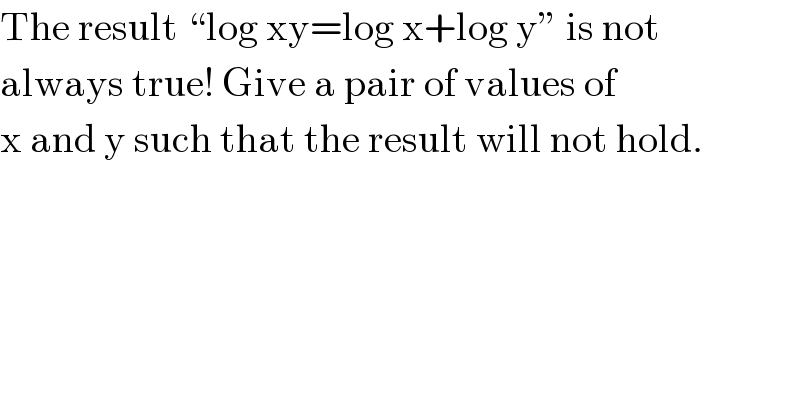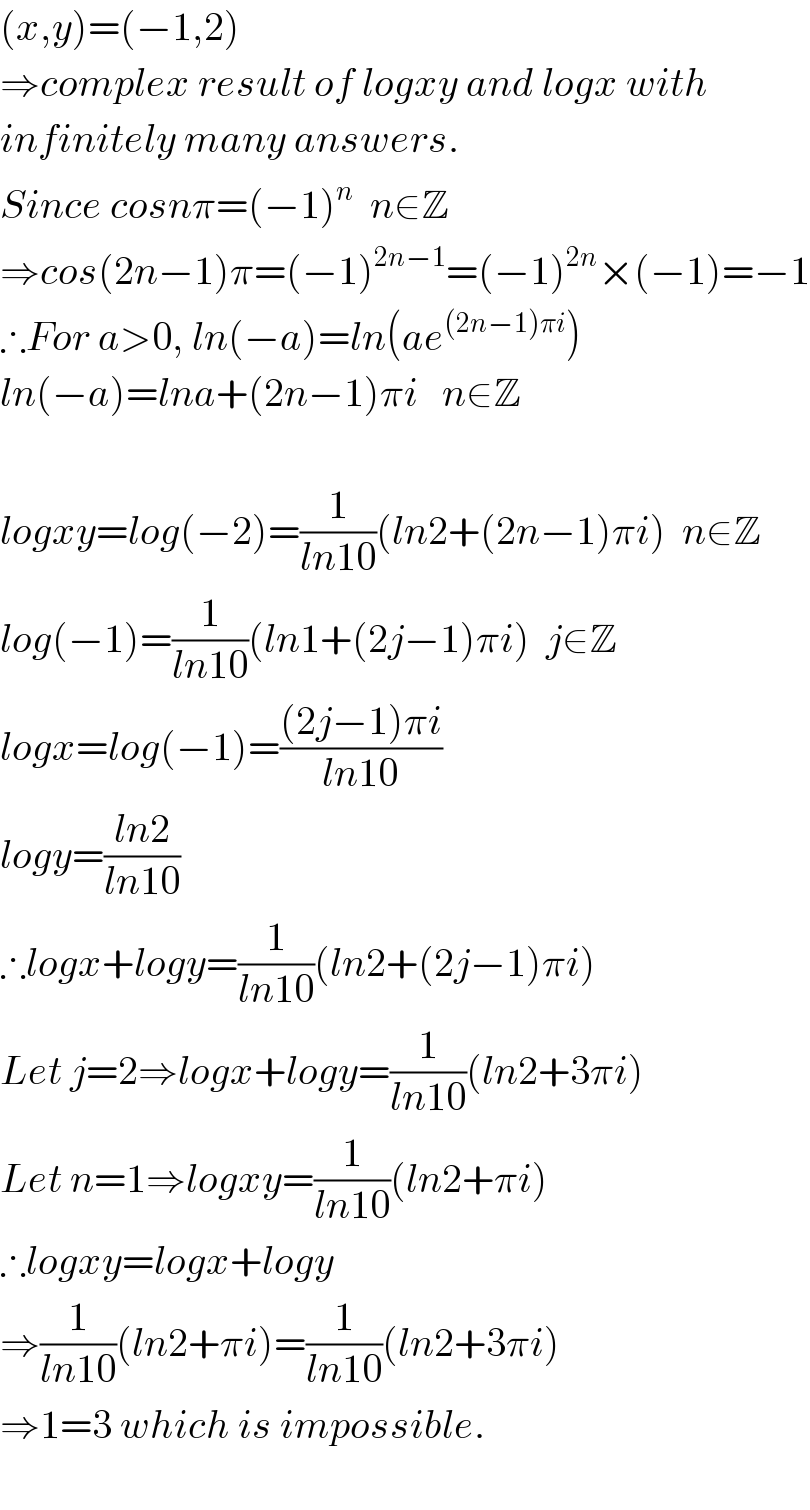Question Number 5569 by Rasheed Soomro last updated on 20/May/16

$$\mathrm{The}\:\mathrm{result}\:“\mathrm{log}\:\mathrm{xy}=\mathrm{log}\:\mathrm{x}+\mathrm{log}\:\mathrm{y}''\:\mathrm{is}\:\mathrm{not} \\ $$$$\mathrm{always}\:\mathrm{true}!\:\mathrm{Give}\:\mathrm{a}\:\mathrm{pair}\:\mathrm{of}\:\mathrm{values}\:\mathrm{of} \\ $$$$\mathrm{x}\:\mathrm{and}\:\mathrm{y}\:\mathrm{such}\:\mathrm{that}\:\mathrm{the}\:\mathrm{result}\:\mathrm{will}\:\mathrm{not}\:\mathrm{hold}. \\ $$
Commented by Yozzii last updated on 20/May/16

$$\left({x},{y}\right)=\left(−\mathrm{1},\mathrm{2}\right) \\ $$$$\Rightarrow{complex}\:{result}\:{of}\:{logxy}\:{and}\:{logx}\:{with} \\ $$$${infinitely}\:{many}\:{answers}. \\ $$$${Since}\:{cosn}\pi=\left(−\mathrm{1}\right)^{{n}} \:\:{n}\in\mathbb{Z} \\ $$$$\Rightarrow{cos}\left(\mathrm{2}{n}−\mathrm{1}\right)\pi=\left(−\mathrm{1}\right)^{\mathrm{2}{n}−\mathrm{1}} =\left(−\mathrm{1}\right)^{\mathrm{2}{n}} ×\left(−\mathrm{1}\right)=−\mathrm{1} \\ $$$$\therefore{For}\:{a}>\mathrm{0},\:{ln}\left(−{a}\right)={ln}\left({ae}^{\left(\mathrm{2}{n}−\mathrm{1}\right)\pi{i}} \right) \\ $$$${ln}\left(−{a}\right)={lna}+\left(\mathrm{2}{n}−\mathrm{1}\right)\pi{i}\:\:\:{n}\in\mathbb{Z} \\ $$$$ \\ $$$${logxy}={log}\left(−\mathrm{2}\right)=\frac{\mathrm{1}}{{ln}\mathrm{10}}\left({ln}\mathrm{2}+\left(\mathrm{2}{n}−\mathrm{1}\right)\pi{i}\right)\:\:{n}\in\mathbb{Z} \\ $$$${log}\left(−\mathrm{1}\right)=\frac{\mathrm{1}}{{ln}\mathrm{10}}\left({ln}\mathrm{1}+\left(\mathrm{2}{j}−\mathrm{1}\right)\pi{i}\right)\:\:{j}\in\mathbb{Z} \\ $$$${logx}={log}\left(−\mathrm{1}\right)=\frac{\left(\mathrm{2}{j}−\mathrm{1}\right)\pi{i}}{{ln}\mathrm{10}} \\ $$$${logy}=\frac{{ln}\mathrm{2}}{{ln}\mathrm{10}} \\ $$$$\therefore{logx}+{logy}=\frac{\mathrm{1}}{{ln}\mathrm{10}}\left({ln}\mathrm{2}+\left(\mathrm{2}{j}−\mathrm{1}\right)\pi{i}\right) \\ $$$${Let}\:{j}=\mathrm{2}\Rightarrow{logx}+{logy}=\frac{\mathrm{1}}{{ln}\mathrm{10}}\left({ln}\mathrm{2}+\mathrm{3}\pi{i}\right) \\ $$$${Let}\:{n}=\mathrm{1}\Rightarrow{logxy}=\frac{\mathrm{1}}{{ln}\mathrm{10}}\left({ln}\mathrm{2}+\pi{i}\right) \\ $$$$\therefore{logxy}={logx}+{logy} \\ $$$$\Rightarrow\frac{\mathrm{1}}{{ln}\mathrm{10}}\left({ln}\mathrm{2}+\pi{i}\right)=\frac{\mathrm{1}}{{ln}\mathrm{10}}\left({ln}\mathrm{2}+\mathrm{3}\pi{i}\right) \\ $$$$\Rightarrow\mathrm{1}=\mathrm{3}\:{which}\:{is}\:{impossible}. \\ $$$$ \\ $$
Commented by Rasheed Soomro last updated on 20/May/16

$$\mathcal{TH}\boldsymbol{\alpha}\mathcal{NKS}! \\ $$
